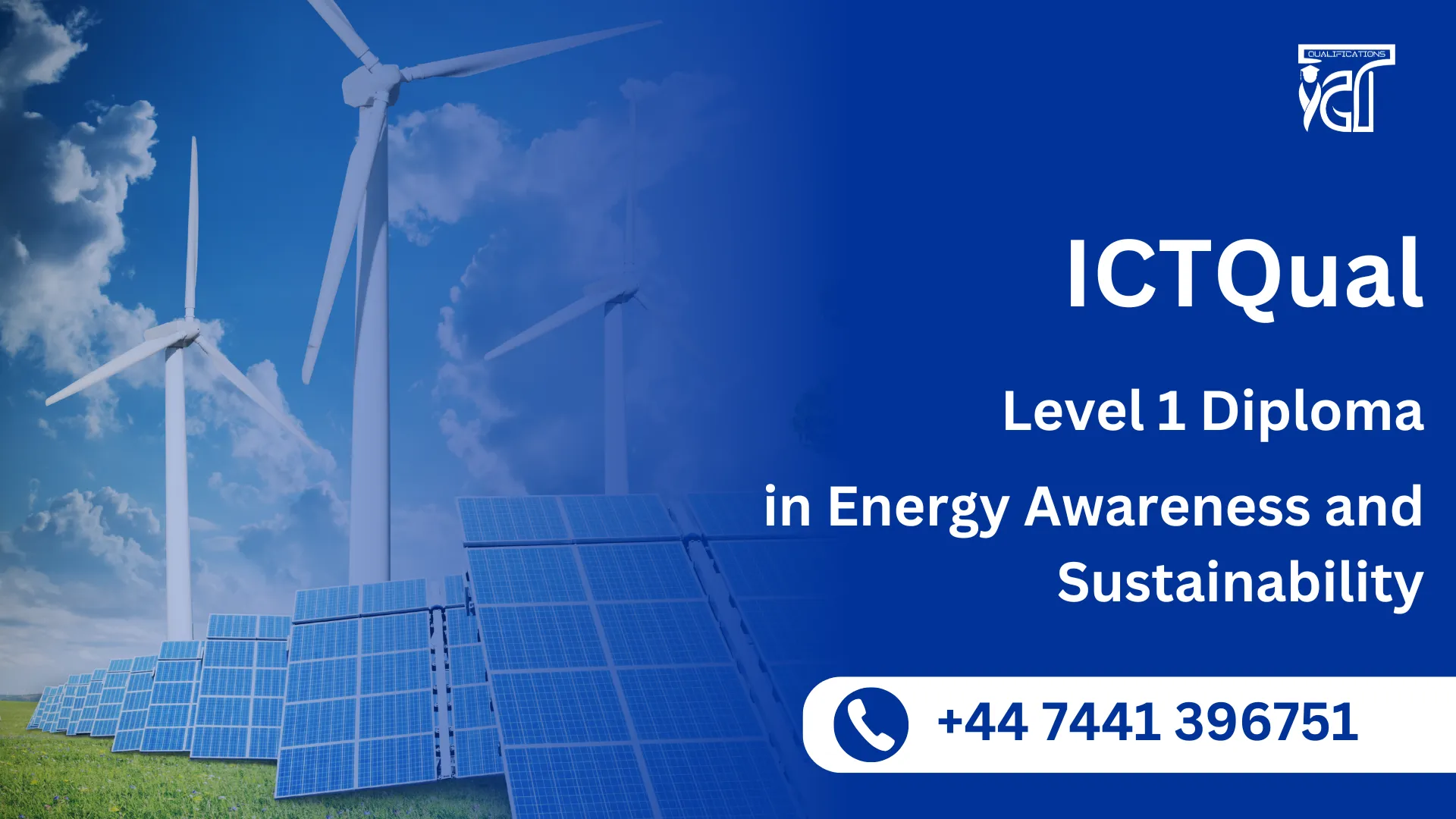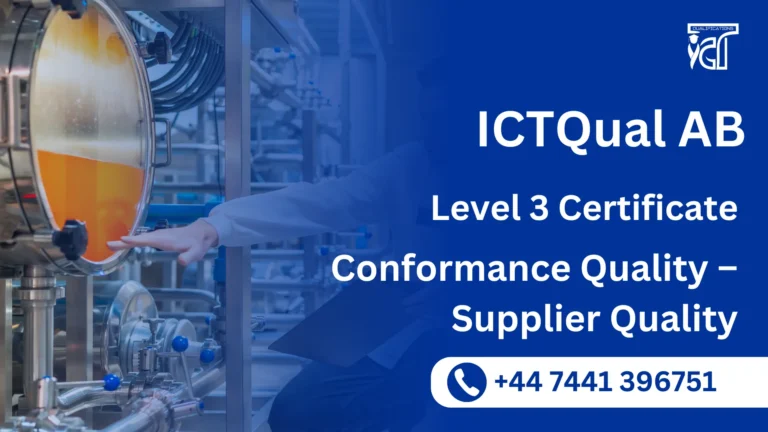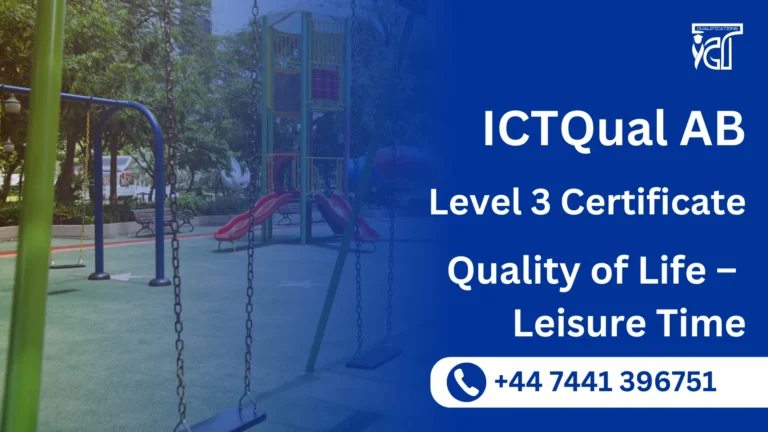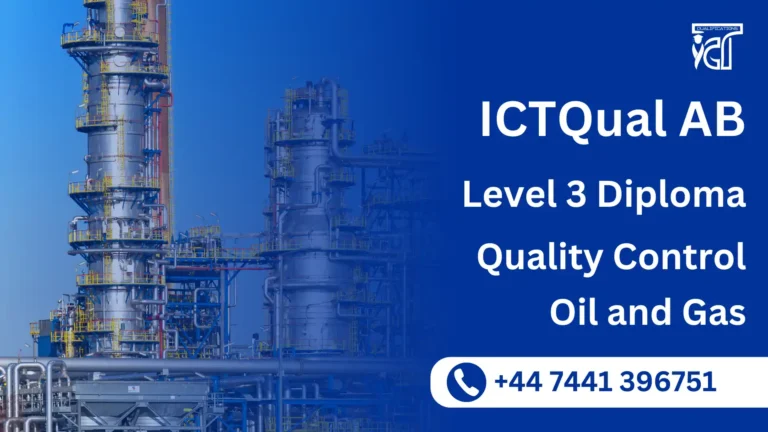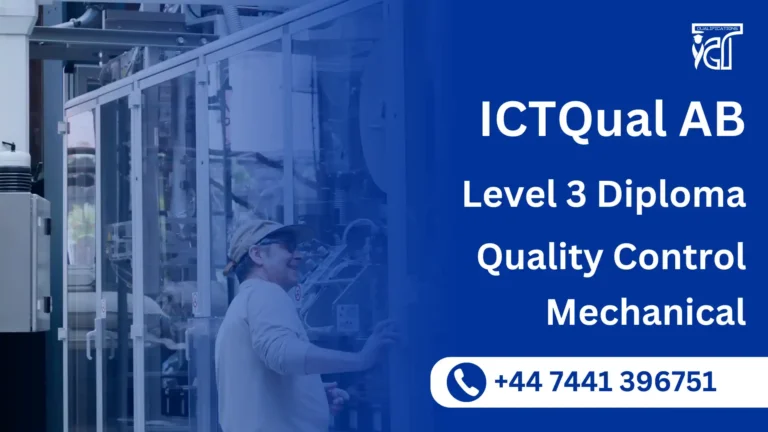In today’s world, where sustainability and environmental conservation are becoming increasingly important, the ICTQual Level 1 Diploma in Energy Awareness and Sustainability offers an excellent foundation for individuals seeking to make a positive impact. This Ofqual-regulated qualification equips students with essential knowledge and practical skills in energy efficiency, sustainability practices, and the importance of reducing environmental footprints. Whether you’re just starting your career or looking to develop a deeper understanding of energy management, this diploma provides the perfect starting point.
The ICTQual Level 1 Diploma in Energy Awareness and Sustainability is designed to give individuals an introductory understanding of energy efficiency, sustainability practices, and how to implement eco-friendly solutions in everyday life. This qualification provides learners with the necessary tools to enhance their awareness of the current environmental challenges and solutions, fostering a more sustainable future.
The course covers a wide range of topics, including energy-saving techniques, renewable energy, sustainable practices in businesses, and the essential role each individual plays in promoting environmental consciousness. This diploma is suitable for both newcomers to the field of sustainability and those looking to deepen their knowledge of energy-related issues.
The ICTQual Level 1 Diploma in Energy Awareness and Sustainability is an essential qualification for anyone interested in starting a career in energy management, sustainability, or environmental protection. It provides valuable, practical knowledge and a clear understanding of energy usage, energy-saving techniques, and sustainable practices. With an increasing focus on environmental conservation, this qualification will not only enhance your career prospects but also help you play a part in creating a sustainable and energy-efficient future.
Are you ready to make a difference in the world of sustainability? Start your journey today with the ICTQual Level 1 Diploma in Energy Awareness and Sustainability!
ICTQual Level 1 Diploma in Energy Awareness and Sustainability
This qualification, the ICTQual Level 1 Diploma in Energy Awareness and Sustainability, consists of 10 mandatory units.
| Sr# | Unit Title |
|---|---|
| 1 | Introduction to Energy & Sustainability |
| 2 | Energy Sources & Industry Applications |
| 3 | Energy Use in Key Industries (Practical Perspective) |
| 4 | Basic Energy Efficiency Practices |
| 5 | Introduction to Carbon Footprint & Environmental Impact |
| 6 | Practical Energy Audits (Industry-Specific Case Studies) |
| 7 | Sustainable Practices Across Industries |
| 8 | Industry Compliance & Energy Regulations (Basic Awareness) |
| 9 | Future Trends in Energy & Sustainability |
| 10 | Final Practical Project |
GLH (Guided Learning Hours) and TQT (Total Qualification Time) are terms commonly used in vocational qualifications to help define the amount of time a learner is expected to spend on their studies.
1. GLH (Guided Learning Hours)
GLH refers to the number of hours a learner spends being directly taught, supervised, or supported during their course. This includes the time spent in activities such as:
- Classroom instruction
- Practical workshops
- One-on-one tutoring or mentoring sessions
- Online learning sessions with tutor support
In other words, GLH represents the time that learners are actively engaged with their instructors or learning activities.
2. TQT (Total Qualification Time)
TQT represents the total amount of time a learner is expected to invest in completing a qualification, including:
- GLH (Guided Learning Hours): Time spent on direct learning, as explained above.
- Self-Directed Learning: This includes time spent on independent study, research, assignment completion, preparation for exams, and any other work the learner does outside of direct teaching hours.
TQT is a broader measure that includes all the time required to achieve the qualification. It helps learners and employers understand the overall commitment required for the qualification.
Key Differences Between GLH and TQT:
- GLH focuses on direct learning with guidance or supervision.
- TQT includes GLH as well as independent study time and other learning-related activities.
Example:
If a qualification has a TQT of 600 hours and a GLH of 250 hours, it means the learner should spend 250 hours in direct learning (classroom, online, or tutor-led sessions) and 350 hours on independent study or research.
Here are the learning outcomes for each study unit:
1. Introduction to Energy & Sustainability
- Understand the concept of energy and sustainability
- Recognize the importance of energy awareness in daily life and industries.
- Analyse global energy consumption trends.
- Understand the role of energy in achieving sustainability goals.
- Apply knowledge of energy and sustainability to real-world scenarios.
2. Energy Sources & Industry Applications
- Understand the principles and applications of renewable energy sources in various industries.
- Understand the principles and applications of non-renewable energy sources in various industries.
- Analyse the environmental and economic impacts of renewable and non-renewable energy sources.
- Apply knowledge of energy sources to solve real-world industry problems.
- Understand the role of innovation and emerging technologies in energy sources and industry applications.
3. Energy Use in Key Industries (Practical Perspective)
- Understand and apply energy optimization techniques in manufacturing and production industries.
- Evaluate energy efficiency strategies in transportation and logistics.
- Implement energy-efficient practices in construction and real estate.
- Identify and apply energy-saving measures in retail and hospitality sectors.
- Apply renewable energy and energy-efficient solutions in agriculture and food processing.
- Demonstrate the ability to conduct energy audits and propose tailored solutions for key industries.
4. Basic Energy Efficiency Practices
- Understand and apply techniques for reducing energy waste
- Evaluate and compare energy-efficient appliances and systems
- Implement workplace energy-saving techniques
- Analyse industry-specific case studies on energy efficiency
5. Introduction to Carbon Footprint & Environmental Impact
- Understand how industries contribute to carbon emissions
- Evaluate practical ways to reduce an industry’s carbon footprint
- Demonstrate a basic understanding of carbon offsetting
- Analyse the environmental impact of industrial activities
- Develop a carbon reduction plan for an industry
6. Practical Energy Audits (Industry-Specific Case Studies)
- Understand the principles and steps of conducting an energy audit.
- Identify energy wastage in various industries
- Conduct a basic energy assessment for a small business or school.
- Apply industry-specific knowledge to energy audits.
- Demonstrate practical skills in energy auditing tools and techniques.
7. Sustainable Practices Across Industries
- Understand and evaluate green energy initiatives in the manufacturing industry.
- Analyse smart energy solutions in the transportation industry
- Implement energy-efficient HVAC and lighting systems in commercial spaces
- Promote sustainable water and energy use in agriculture.
- Evaluate the role of policy and innovation in driving sustainable practices across industries.
8. Industry Compliance & Energy Regulations (Basic Awareness)
- Understand energy regulations in key industries
- Understand workplace safety and energy conservation laws
- Analyse real-world case studies of companies implementing sustainable energy policies
- Apply knowledge of energy regulations to practical scenarios
9. Future Trends in Energy & Sustainability
- Understand the concept and applications of smart grids in modern energy systems.
- Explore the role of Artificial Intelligence (AI) in energy management.
- Understand the concept of carbon-neutral businesses and their role in sustainability.
- Examine how industries are preparing for sustainable energy transitions.
- Explore emerging trends and innovations in energy and sustainability.
10. Final Practical Project
- Conduct a Mini Energy Assessment
- Identify Industry-Specific Energy Challenges
- Propose Energy-Saving Solutions
- Develop an Implementation Plan
- Evaluate the Impact of Proposed Solutions
- Communicate Findings and Recommendations
Benefits of the ICTQual Level 1 Diploma in Energy Awareness and Sustainability
The ICTQual Level 1 Diploma in Energy Awareness and Sustainability offers a range of valuable benefits for individuals looking to understand and contribute to a more sustainable future. This qualification provides learners with essential knowledge and skills related to energy management, sustainability practices, and environmental awareness. Below are the key benefits of enrolling in this course:
1. Foundational Knowledge in Energy Awareness
- Gain a solid understanding of energy efficiency, consumption, and how individual actions can impact the environment. This foundational knowledge prepares you for future studies or careers in the energy and sustainability sectors.
2. Hands-on Learning and Practical Application
- Learn practical, real-world techniques to reduce energy consumption, implement energy-saving strategies, and promote sustainable practices. This practical approach ensures that you can apply your knowledge in everyday life and business settings.
3. Increased Career Opportunities
- The demand for professionals with energy and sustainability knowledge is on the rise. Completing this diploma provides you with a qualification recognized across industries, improving your chances of securing a role in green energy, sustainability consultancy, or environmental management.
4. Contribution to Environmental Conservation
- This course equips you with the tools to reduce your carbon footprint and promote environmentally friendly practices in both personal and professional settings. You will be part of the growing movement towards sustainability and climate change mitigation.
5. Recognized and Ofqual-Regulated Qualification
- The ICTQual Level 1 Diploma in Energy Awareness and Sustainability is Ofqual-regulated, meaning it is officially recognized and trusted by employers, educational institutions, and governmental organizations, both in the UK and internationally.
6. Flexible Learning Options
- The course is offered in flexible formats, including online learning, allowing you to study at your own pace and schedule. This makes it accessible for individuals balancing work, studies, or other commitments.
7. Foundation for Further Education
- After completing this diploma, you can progress to more advanced energy and sustainability qualifications, such as the ICTQual Level 2 Diploma in Energy Efficiency and Renewable Technologies, to deepen your expertise in energy management and sustainable practices.
8. Practical Tools for Sustainable Living
- Learn how to make energy-efficient decisions in daily life, from reducing home energy use to implementing sustainability practices in workplaces or communities. These skills benefit not only your professional life but also your personal commitment to a greener world.
9. Understanding Environmental Legislation
- The course covers key environmental policies and regulations, helping you understand how governments and organizations promote sustainability, ensuring that you are aware of legal frameworks that guide energy efficiency and conservation.
10. Positive Impact on Personal and Professional Life
- Whether you’re aiming to enhance your qualifications for career advancement or simply looking to reduce your environmental impact, this course offers the knowledge and skills to create lasting change in both your personal and professional life.
Best Fit for the ICTQual Level 1 Diploma in Energy Awareness and Sustainability
The ICTQual Level 1 Diploma in Energy Awareness and Sustainability is an ideal course for a wide range of individuals who are interested in understanding and applying energy efficiency and sustainability practices. This qualification is particularly suited for the following groups:
1. Individuals New to the Energy and Sustainability Sector
- If you are looking to start a career in energy management, environmental conservation, or sustainability but have limited experience, this course provides an excellent foundation. It covers the essential principles of energy awareness, sustainability, and the environment, offering the knowledge you need to move forward in the green sector.
2. Eco-conscious Consumers and Homeowners
- For individuals who are passionate about making their homes and lifestyles more sustainable, this course will equip you with the tools to make informed decisions that reduce energy consumption and environmental impact. You’ll learn practical, energy-saving strategies that you can apply in your everyday life.
3. Students and Recent Graduates
- If you have a background in environmental studies, science, or engineering and wish to further specialize in energy efficiency and sustainability, this qualification is an ideal stepping stone. It will add value to your CV and demonstrate your commitment to sustainability, making you more attractive to future employers in the green industry.
4. Employees in Energy-Related Fields
- Individuals working in industries such as construction, facilities management, or engineering who wish to enhance their knowledge of energy efficiency and sustainability will find this diploma highly beneficial. The course will provide you with the necessary skills to implement energy-saving practices and contribute to your organization’s sustainability goals.
5. Career Changers
- If you’re looking to transition into the energy and sustainability sector from a different field, the ICTQual Level 1 Diploma offers an accessible entry point. The course is designed to build foundational knowledge, making it an excellent option for those looking to switch careers and enter the green economy.
6. Business Owners and Managers
- Small business owners and managers who are interested in making their operations more energy-efficient and sustainable can benefit from this course. By gaining a deeper understanding of energy management, you can reduce costs, increase efficiency, and improve your company’s environmental impact.
7. Environmental Volunteers and Activists
- If you’re involved in environmental activism or volunteering, this course will provide you with deeper insights into energy sustainability and the broader impacts of climate change. You will be better equipped to advocate for energy efficiency and educate others on how to make more sustainable choices.
8. Government and Non-Profit Sector Employees
- Those working in governmental or non-profit organizations focused on environmental issues, energy policy, or community development can benefit greatly from this diploma. It will enhance your understanding of sustainability practices and energy management, enabling you to better serve your community and contribute to environmental initiatives.
By enrolling in the ICTQual Level 1 Diploma in Energy Awareness and Sustainability, you’re not only gaining knowledge but also positioning yourself for success in a rapidly growing industry focused on sustainability and the protection of our planet. Whether you are a beginner, a career changer, or someone already working in the field, this course provides the foundational skills needed to make a tangible difference in the world of energy efficiency and sustainability.
Entry Requirements
Register Now
Qualification Process
Qualification Process for the ICTQual Level 1 Diploma in Energy Awareness and Sustainability
- Self-Assessment:
Begin by evaluating your eligibility to ensure you meet the qualification requirements, including work experience, knowledge, and language proficiency. - Registration:
Complete your registration by submitting the required documents, including a scanned copy of a valid ID, and paying the registration fee. - Induction:
An assessor will conduct an induction to confirm your eligibility for the course and explain the evidence requirements. If you do not meet the criteria, your registration will be canceled, and the fee will be refunded. - Assignmnets & Evidence Submission:
Provide all assignmnets and the necessary evidence based on the assessment criteria outlined in the course. If you are unsure of the required evidence, consult with the assessor for guidance on the type and nature of evidence needed. - Feedback and Revision:
The assessor will review your submitted evidence and provide feedback. Evidence that meets the criteria will be marked as “Criteria Met,” while any gaps will be identified. You will be asked to revise and resubmit if needed. - Competence Evidence:
Submit final evidence demonstrating that all learning outcomes have been met. This evidence will be marked as “Criteria Met” by the assessor once it is satisfactory. - Internal Quality Assurance (IQA):
The Internal Quality Assurance Verifier (IQA) will review your evidence to ensure consistency, quality, and compliance with standards. - External Verification:
The IQA will submit your portfolio to ICTQUAL AB External Quality Assurance Verifiers (EQA) for final confirmation. The EQA may contact you directly to verify the authenticity of your evidence. - Certification:
Upon successful completion of all checks, ICTQUAL AB will issue your official certificate, confirming that you have attained the ICTQual Level 1 Diploma in Energy Awareness and Sustainability.

